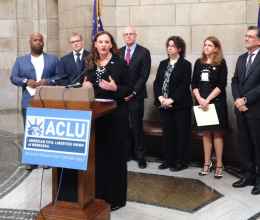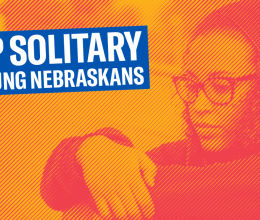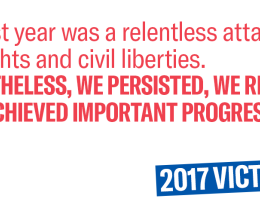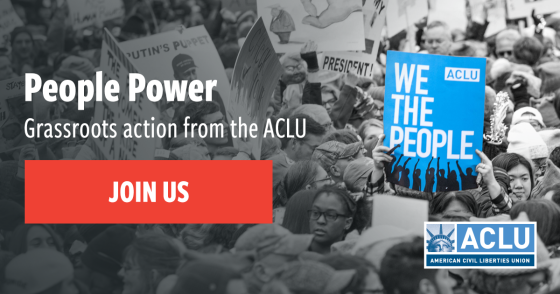Second Chances: How professional licensing in Nebraska hurts the workforce and our economy
Campaign for Smart Justice | Policy Overview | Who Is Affected | Nebraska Overview | Recent Reforms Across the Country | Recomendations | Conclusion | Table of Professional Licenses
About the ACLU of Nebraska
The ACLU of Nebraska is a non-profit, non-partisan organization that works to defend and strengthen the individual rights and liberties guaranteed in the United States and Nebraska Constitutions through a sophisticated program of integrated advocacy with strategies that include litigation, negotiation, policy research, and public education. In 2016 we are proudly celebrating our 50th anniversary and are supported by over 2,000 members and about 10,000 supporters stretching far across our great state.
The ACLU of Nebraska's Campaign for Smart Justice
Criminal justice policies in Nebraska and around the United States have created a system of mass incarceration which hurts our communities and disproportionately impacts low income families and communities of color. Too many of our neighbors who commit nonviolent offenses are ensnared in a prison system that is severely overcrowded. Existing prison conditions violate the 8th Amendment’s protection against cruel and unusual punishment and do not provide a meaningful transition back into our communities and our economy. The ACLU is leading the way to rethink and reform these policies and conditions though our Campaign for Smart Justice to protect individual rights, reduce the taxpayer burden, and make our communities safer.
"Tough on crime" policies, particularly around punitive drug policies, have failed to achieve public safety while putting an unprecedented number of people behind bars and eroding constitutional rights. This system also erodes economic opportunity, family stability, and civic engagement during incarceration and can create lifelong challenges upon release. America, Land of the Free, has earned the disturbing distinction of being the world's leading jailer. Nebraska has a role to play in reducing America's addiction to incarceration and providing programs that help those convicted of a crime to turn their lives around.
Policy Overview
Approximately 1 in 3 adults in the U.S. has a criminal record.[1] That’s about the same number of Americans who have a college diploma.[2] Among the long-term impacts of having a criminal record is that many people find it nearly impossible to obtain employment. Many job applications have a checkbox asking applicants to disclose if they have a criminal record. While “ban the box” legislation attempts to address this by banning questions about felony conviction on first-round employment applications, the employer is not the only barrier to meaningful employment. Nearing 200 of Nebraska professions require some form of licensure by the state and many of those careers bar or impede people with a criminal record. Even those who have paid their debt to society, turned their lives around, and have not re-offended in years find they have a lifetime label that denies them any chance of economic opportunity and a fresh start. These limitations do not just have an effect on the ex-offender; their spouses and children are impacted as well. There are many Nebraskans caught up in the criminal justice system—1 in 10 Nebraska children have a parent in jail—so these barriers impact many lives.[3] The ACLU believes that improvements can be made in Nebraska to modernize law, policy, and practices surrounding criminal history disclosures for many professional and occupational licenses.
Who Is Affected
It is difficult to assess the number of Nebraskans with a past conviction. Every year, the Nebraska Department of Corrections estimates over 2,000 people with a felony conviction complete their sentence and are returned to our communities.[4] According to legislative researchers, there were approximately 59,000 free Nebraskans with a former felony conviction in 2005.[5] Obviously, there are even more Nebraskans with a misdemeanor conviction.
A large number of people with a criminal record are offenders whose crime was nonviolent and resulted from drug or alcohol dependence. Drug, alcohol, and property crimes charges continue to make up the bulk of criminal offenses in Nebraska every year.[6] Nebraska’s recidivism rates are low and most offenders recover from drug dependence, serve their sentence, and return to their communities.[7]
Decades into a failed “War on Drugs,” we still arrest, convict, and imprison people who struggle with addiction at very high rates. These failed policies have a lifelong impact by making it incredibly difficult for an offender to re-integrate into society when a sentence is finished. The Department of Justice has identified that a key element in reducing recidivism is the ability to obtain gainful employment.[8]
As President George W. Bush said in his 2004 State of the Union Address, “This year, some 600,000 inmates will be released from prison back into society. We know from long experience that if they can’t find work, or a home, or help, they are much more likely to commit more crimes and return to prison…America is the land of the second chance, and when the gates of the prison open, the path ahead should lead to a better life.”
Support for giving ex-offenders a second chance crosses all political and partisan lines. For example, the Koch Brothers have announced their support of “ban the box” efforts and Charles Koch has said “There are plenty of people who have been arrested and gotten out who are good people.”[9]
Nebraska Laws and Former Offender Employment
Nebraska took a step towards fairness in banning the box for public employment when the legislature nearly unanimously voted to enact LB 907 in 2014 to prohibit public employers from requiring an applicant to disclose their criminal history until it has been determined the applicant meets minimum employment qualifications.[10]
However, countless occupational and professional license applications continue to require criminal history disclosure on the initial application. If we wish to ensure a second chance for the offender and his or her family, it is imperative that action be taken to ensure all former offenders who are otherwise capable of becoming licensed professionals are given a fair chance to do so.
According to a 2015 report by the Department of Labor, there are 176 licensed occupations in Nebraska.[11] These professions range from very skilled work that usually accompanies an advanced degree (such as accountants, architects, engineers, lawyers and physicians) to physical labor jobs (well drillers, asbestos removal worker, lead worker, horse stable employee) to jobs that traditionally might be started as a small business by an entrepreneur (tattooist, manicurist, child daycare worker).
See a non-exhaustive sample of licensed professions in Nebraska that inquire about an applicant’s criminal history.
A national study of licensed professions, authored by the Institute for Justice, rated Nebraska quite high for having some of the least burdensome licensure requirements in the U.S.[12] However, their report also documented the impact of occupational licensing for those "on the first several rungs of the economic ladder in low-to-moderate income occupations." In other words, the same jobs for which a former offender might be applying are occupations requiring a license.
Some of these licensing barriers are explicitly in statute. Some have been promulgated in regulations. Some professions simply inquire into criminal history on the application form—and those inquiries are not limited to convictions but also can include questions about charges that didn’t result in a conviction.
Mandatory criminal history disclosures on professional and occupational license applications purportedly aim to advance health and safety. There are good public policy reasons to allow an in-home daycare provider to be barred from licensure if she has a conviction for child abuse. However, most of these barriers aren’t explicitly seeking a link between the nature of the profession and the conviction. Limits on a horse trainer who once shoplifted or a manicurist who had a driving under the influence charge do not reflect an individual’s capability within their field.
Furthermore, having an applicant’s entire criminal record reviewed alongside their application allows the specter of discriminatory practices, where an otherwise qualified individual might be rejected based on unconscious bias.
“As a professional who works with people who have a felony conviction and a person who has been convicted of a felony, I know firsthand the impact these restrictions have on reentry planning,” said Stennis-Williams. “Most restrictions do not have a rational relationship to the risk of someone reoffending. These restrictions often hamper our ability to get individuals into training programs so they can fully contribute to our communities.” - LaVon Stennis-Williams, ReConnect of Omaha
Finally, a number of Nebraska licensed professions do not specifically ban former offenders but their certification process requires applicants to be of “good moral character.” The vague and unstated terms of what constitutes “good moral character” create the perception that an applicant with a criminal record may be automatically considered immoral and untrustworthy. For example, being an entry level nursing assistant in Nebraska requires a license and all applicants are asked whether they have been involved in a crime of “moral turpitude.” The state informs applicants that moral turpitude means any “act or behavior that violates accepted moral standards and in legal terms means anything done contrary to justice, honesty, modesty, good morals.”[13] Use of vague standards such as “moral turpitude” or “being of good moral character” has been characterized by the U.S. Supreme Court as “unusually ambiguous” with the potential to serve as a “dangerous instrument for arbitrary and discriminatory denial” of professional and occupational licenses.[14]
These license requirements can prove especially problematic in rural areas where employment opportunities may be limited. Horse groomers, nursing home dining assistants, and farm labor contractors must obtain state licenses, and all of these licensing applications inquire about applicants’ criminal history.
Because many professions require a state license that poses barriers for anyone with a conviction, these Nebraskans remain second-class citizens without the chance to become financially stable and self-supporting.
Recent Reforms Across the Country
In 2012, the United States Equal Employment Opportunity Commission (EEOC) issued their first ever guidance on how employers should address the issue of people with a criminal history. Given the disproportionate impact our criminal justice system has on communities of color, the EEOC announced that outright bans on hiring someone with a felony conviction may implicate Title VII of the Civil Rights Act. Title VII is the federal law that forbids employers from discriminating against employees on the basis of sex, race, color, national origin, and religion.
The EEOC now recommends that employers consider both whether a conviction is related to the occupation and how much time has passed since the conviction.[15]
While there have not yet been case rulings on whether a state licensing agency should only be allowed to inquire as to recent past convictions which relate to the occupation, that may be the litigation wave of the future.
Several states have passed reforms in response to the EEOC guidance. In a first-ever nationwide assessment of licensing laws, the National Employment Law Project (NELP) identified the states with the most effective laws reflecting these EEOC recommendations.[16] The NELP report, issued in April 2016, graded states on their compliance with the new EEOC guidance. Nebraska fared badly in their report, since we have no overarching statute protecting former offenders from discrimination unrelated to the nature of their conviction.[17]
States as diverse as Minnesota, Kansas, Pennsylvania, and New Jersey have passed laws to ensure fair treatment of former offenders seeking professional licenses.[18] Minnesota passed a statute stating that a person with a conviction:
“shall not be disqualified from the employment or occupation if the person can show competent evidence of sufficient rehabilitation and present fitness to perform the duties.”[19]
“Evidence of sufficient rehabilitation” include completion of probation or parole.[20]
Kentucky addressed the myriad regulations and statutes by passing a general unification statute superseding all licensing regulations and policies. Their statute says their rule on eligibility of former offenders “shall prevail over any other laws, rules, and regulations which purport to govern the granting, denial, renewal, suspension, or revocation of a license on the grounds of conviction of a crime or crimes.”[21]
NELP’s report offers state-by-state examples and model legislation to ensure former offenders can be evaluated fairly and not be barred outright from achieving economic self-sufficiency. Part of the difficulty in suggesting an easy fix is the fact that Nebraska does not have a single overarching law regarding occupational or professional licensing—there are criminal history inquiries built into a myriad of statutes, regulations, and application forms governed by various public boards. Reform will either need many individual boards to take steps to reform their own regulations and practices or the Unicameral will need to pass a single overarching statute that explicitly applies to all licensed professions. Several possibilities for reform are offered here.
Recommendations
Some states have already implemented a variety of reforms on this topic to ensure they are meeting best practices to best serve the economic needs of their constituents and their states. Each of the options identified below holds the potential to remove barriers to employment for those with a criminal record and is worthy of consideration by Nebraska policymakers.
Pass a state law that forbids discrimination by licensing authorities unless the conviction was directly related to the type of employment.
Minnesota and Kentucky’s state statutes prohibit discrimination by an employer or licensing entity unless the conviction “directly relates to the position of employment sought or the occupation for which the license is sought.”[22]
To clarify the scope of this protection, Kentucky further passed a state law specifically superseding all regulations or prior statutes that required a background check, moral fitness, or ban on someone with a conviction.[23]
Rewrite governing regulations to take into consideration rehabilitation and/or mitigating circumstances, and provide applicants with the opportunity to address any concerns.
While there may be certain occupation-related offenses detrimental to an applicant’s ability to obtain licensure, applicants should be given an opportunity to address the licensing agency’s concerns. No one should forever be defined by their past mistakes. Should an applicant have an identified disqualification, they should be allowed the opportunity to submit evidence indicating successful rehabilitation that meets occupational requirements.
Remove ambiguous language and implement uniform standards.
Vague requirements of “good moral character” should be removed from all Nebraska licensing requirements, whether in statute or licensing regulations. Not only is such a standard too vague to enforce, but it appears to be a code to discourage applicants with a criminal history.
“Ban-the-box” in private employment and other self-reporting requirements.
While Nebraska took the first step of “banning the box” for public employers, banning the box for all employers and all professional licenses would go the farthest in ensuring former offenders have a fair chance at rehabilitation. The EEOC guidance says “as a best practice…employers not ask about convictions on job applications.”[24] Prohibiting criminal record inquiries until after an applicant is determined to meet all other occupational requirements completely eliminates any prejudice of an applicant as a result of a criminal history and allows all applicants to be assessed on their merits.
Conclusion
Advocates in re-entry programs with former offenders tell us that they repeatedly see people who are released from prison go back to school and complete their education, only to discover their past conviction prevents them from obtaining a job. Our great state benefits when all Nebraskans willing to contribute to their communities and families have an opportunity to pursue professional occupations.
Removing barriers to professional licenses will allow all Nebraskans a fair chance at gainful employment. In turn, former offenders who obtain a professional job instead of relying upon a patchwork of minimal wage employment will be more likely to contribute to their families’ economic well-being, and fully re-integrate into society without re-offending. People who have served their sentence and returned to their community should have the hurdles to employment taken out of their path as they journey on their fresh start.
Nebraska has already begun cutting the red tape holding people back from gainful employment by passing our public employment "ban the box" law. We need to take the next step to pull down the hurdles in the path of people in licensed professions. Removing hurdles to employment allows each Nebraskan to contribute at their highest potential which will grow our shared economy, increase public safety, and ensure strong families.
Selection of Professional Licenses Which Presents Barriers to People with a Criminal Conviction
| Profession | Statute | Regulations |
|---|---|---|
| Abstractor | Neb. Admin. Code Abstr, RULE NO. 2 | |
| Accountant | Neb.Rev.St. § 1-137 | |
| Accupunturist | Neb.Rev.St. § 38-2058 | |
| Agricultural Engineer | 110 Neb. Admin. Code Ch. 2, 2.5 | |
| Aircraft & Civil Aviation Mechanic | ||
| Advanced Practice Registered Nurse | Neb.Rev.St. § 38-207 | 172 Neb. Admin. Code Ch. 100, 003.02 |
| Alcohol and Drug Counselor | Neb.Rev.St. § 38-313 | 172 Neb. Admin. Code Ch. 15, 003.02 |
| Appraiser | 298 Neb. Admin. Code Ch. 6 (conviction request is in application, not reg) |
|
| Architect / Engineer | 110 Neb. Admin. Code Ch. 2, 2.5 | |
| Asbestos Worker | Neb.Rev.St. § 71-6310 | 178 Neb. Admin. Code Ch. 22, 004.02B |
| Athletic Training | Neb.Rev.St. § 38-410 | 172 Neb. Admin. Code Ch. 17, 003.02 |
| Attorney | ||
| Audiology/Speech-Language Pathology and Assistants | Neb.Rev.St. § 38-515 | 172 Neb. Admin. Code Ch. 23, 003.02 172 Neb. Admin. Code Ch. 24, 003.02 |
| Bank Executive Officer | Neb.Rev.St. § 8-139 | |
| Barber / Barber Instructor | 172 Neb. Admin. Code Ch. 36, 003.01B | |
| Body Art / Tattoo, Piercing | Neb.Rev.St. § 38-1060 | 172 Neb. Admin. Code Ch. 44, 003.01B |
| Child Care, In-home license | Neb.Rev.St. § 71-1908 to 71-1923 | |
| Chiroprator | Neb.Rev.St. § 38-807 | 172 Neb. Admin. Code Ch. 29, 003.02 |
| Cosmetologist / Cosmetologist Instructor | Neb.Rev.St. § 38-1058 | 172 Neb. Admin. Code Ch. 36, 003.01B |
| Dentist / Dental Hygenist | Neb.Rev.St. § 38-1117, 38-1118 | 172 Neb. Admin. Code Ch. 56, 003.04 |
| Electrology / Electrology Instructor | Neb.Rev.St. § 38-1059 | 172 Neb. Admin. Code Ch. 36, 003.01B |
| Emergency Medical Services (Out of Hospital) | Neb.Rev.St. § 38-1221 | 172 Neb. Admin. Code Ch. 11, 003.02 |
| Environmental Health Specialist | Neb.Rev.St. § 38-1308 | 172 Neb. Admin. Code Ch. 168, 003.02 |
| Esthetician / Esthetician Instructor | 172 Neb. Admin. Code Ch. 36, 003.01B | |
| Funeral Directing & Embalming | Neb.Rev.St. § 38-1414 | 172 Neb. Admin. Code Ch. 67, 003 |
| Genetic Counselor | Neb.Rev.St. § 38-3416 | 172 Neb. Admin. Code Ch. 92, 003.01 |
| Hearing Instrument Specialist | Neb.Rev.St. § 38-1509 | 172 Neb. Admin. Code Ch. 72, Attachment A |
| Horse Trainer, Jockey, Stable Employee, Trainer | 294 Neb. Admin. Code Ch. 10, 014 (application includes conviction questions) | |
| Landscape Architect | (application includes conviction question) | |
| Lead Worker | Neb.Rev.St. § 71-6319.04 - 6319.10 | |
| Liquor License | (application includes conviction question) | |
| Massage Therapy | Neb.Rev.St. § 38-1710 | 172 Neb. Admin. Code Ch. 81, 002 |
| Medical Nutrition Therapist | Neb.Rev.St. § 38-1813 | 172 Neb. Admin. Code Ch. 61, 003.02 |
| Medical Radiography | Neb.Rev.St. § 38-1915 | |
| Medication Aid | 172 Neb. Admin. Code Ch. 96, 003.01 | |
| Midwife | 172 Neb. Admin. Code Ch. 104, 003.02 | |
| Mental Health Practicioner / Counselor | 172 Neb. Admin. Code Ch. 94, 003.01B | |
| Nail Technology / Instructor | Neb.Rev.St. § 38-10,128 | 172 Neb. Admin. Code Ch. 36, 003.01B |
| Nurse Anesthetists | 172 Neb. Admin. Code Ch. 103, 003.02 | |
| Nursing (RN / LPN) | Neb.Rev.St. § 38-131 | 172 Neb. Admin. Code Ch. 102, 004.01 172 Neb. Admin. Code Ch. 101, 003.01B1 |
| Nursing Assistant | 172 Neb. Admin. Code Ch. 108, 005.01 | |
| Nursing Home Administrator | 172 Neb. Admin. Code Ch. 106, 003.02 | |
| Nurse Specialist | 172 Neb. Admin. Code Ch. 107, 003.02 | |
| Occupational Therapy / Assistant | 172 Neb. Admin. Code Ch. 114, 003.02 | |
| Optometry | 172 Neb. Admin. Code Ch. 120, 003.02 | |
| Paid Dining Assistant | 172 Neb. Admin. Code Ch. 105, 003 | |
| Perfusionist | Neb.Rev.St. § 38-2704 | 172 Neb. Admin. Code Ch. 91, 003.02 |
| Pharmacy Professions | 172 Neb. Admin. Code Ch. 128, 003.01 | |
| Physical Therapy | 172 Neb. Admin. Code Ch. 137, 003.02 | |
| Physician Assistant | Neb.Rev.St. § 38-2049. | 172 Neb. Admin. Code Ch. 90, 008.01 |
| Physician | Neb.Rev.St. § 38-2026 | |
| Podiatrist | 172 Neb. Admin. Code Ch. 143, 003.01 | |
| Pre-Need Agent (sells burial plots) | Neb.Rev.St. § 12-1108 | |
| Psychology | 172 Neb. Admin. Code Ch. 155, 003.01B | |
| Radiographer | ||
| Radon Tester | Neb. Rev. Stat. 38-131 | |
| Real Estate Broker, Salesperson, Property Appraiser | Neb. Rev. Stat. 81-885.12 | |
| Respiratory Care | 172 Neb. Admin. Code Ch. 162, 003.02 | |
| Truth and Deception Examiners; Collection Agency Licensing; Private Detectives; Athlete Agents; Notaries | (application includes conviction questions) | |
| Veterinarian | 172 Neb. Admin. Code Ch. 180, 003.01A | |
| Veterinarian Tech | 172 Neb. Admin. Code Ch. 180, 003.02B | |
| Waster Water Treatment Operator/Professional / Water Treatment Plant Operator | 178 Neb. Admin. Code Ch. 10, 004 | |
| Well Drillers | 178 Neb. Admin. Code Ch. 10, 004 | |
| Wrecker/Salvage Dealer | Neb. Rev. Stat. 60-1411.02 |
[1] U.S. Department of Justice, “Survey of State Criminal Historal Information Systems,” (2014): https://www.ncjrs.gov/pdffiles1/bjs/grants/244563.pdf
[2] “Just Facts,” Brennan Center for Justice (2015): https://www.brennancenter.org/blog/just-facts-many-americans-have-criminal-records-college-diplomas
[3] Annie E. Casey Foundation, “A Shared Sentence: The Devastating Toll of Parental Incarceration on Kids, Families, and Communities,” (2016): http://www.aecf.org/resources/a-shared-sentence/
[4] “Prisoner Reentry FAQ,” Legislative Research Office (2014), page 6. http://www.nebraskalegislature.gov/pdf/reports/research/prisonerreentryf...
[6] In 2014, there were 37,133 arrests for DUI, liquor violations, drug offenses, theft/larceny in comparison to 4,775 arrests for violent crimes. Nebraska Crime Commission “Crime in Nebraska” series. Online: https://ncc.nebraska.gov/sites/ncc.nebraska.gov/files/pdf/stats_and_research/14_Crime_In_Nebraska.pdf
[7] Nebraska Department of Correctional Services 3-Year Recidivism Data Report. Online: http://www.corrections.nebraska.gov/pdf/NDCS%203-Year%20Recidivism%20Data.pdf
[8] U.S. Department of Justice, “Prisoners and Prisoner Re-Entry,” online: https://www.justice.gov/archive/fbci/progmenu_reentry.html
[10] Nebraska Revised Statute § 48-202
[12] Institute for Justice, “License to Work: A National Study of Burdens from Occupational Licensing,” (2012): http://ij.org/report/license-to-work/
[13] Nebraska Department of Health and Human Services “Requirements for Placement on the Nebraska Nurse Aide Registry:” http://dhhs.ne.gov/publichealth/Pages/crl_nursing_na_na.aspx#Disqualific...
[14] Konigsberg v. State Bar of Cal., 353 U.S. 252, 263 (1957) (stopping short of declaring the “good moral character” standard unconstitutionally vague).
[15] U.S. Equal Employment Opportunity Commission’s Enforcement Guidance on the Consideration of Arrest and Conviction Records in Employment Decisions Under Title VII of the Civil Rights Act of 1964 (Apr. 25, 2012), at 11, 16, www.eeoc.gov/laws/guidance/arrest_conviction. (hereinafter EEOC Guidance).
[16] National Employment Law Project, “Unlicensed & Untapped: Removing Barriers to State Occupational Licenses for People with Records,” (2016): http://www.nelp.org/publication/unlicensed-untapped-removing-barriers-st...
[17] Id.
[18] Id. at 21-22.
[19] Minn. Stat. 364.03(3)
[20] Id.
[21] Ky. Rev. Stat. 335B.060.
[22] Ky. Rev. Stat. 335B.020 and Minn. Stat. 464.03
[23] Ky. Rev. Stat. 335B.060
[24] EEOC Guidance at 13-14.
Related content

The Prison Lawsuit: David vs. Goliath
January 8, 2019ACLU Files Court Challenge to State of Nebraska’s Execution Protocol
March 26, 2018Nebraska Is Illegally Obtaining and Storing Execution Drugs in...
March 12, 2018ACLU Statement on Dept. of Corrections Issuing of a Death Notice
January 19, 2018ACLU Applauds Introduction of Bill Limiting Solitary Confinement...
January 5, 2018
I spent my 16th Birthday Alone in a Cell
January 5, 2018ACLU of Nebraska Applauds Introduction of Bill Addressing High...
January 3, 2018
